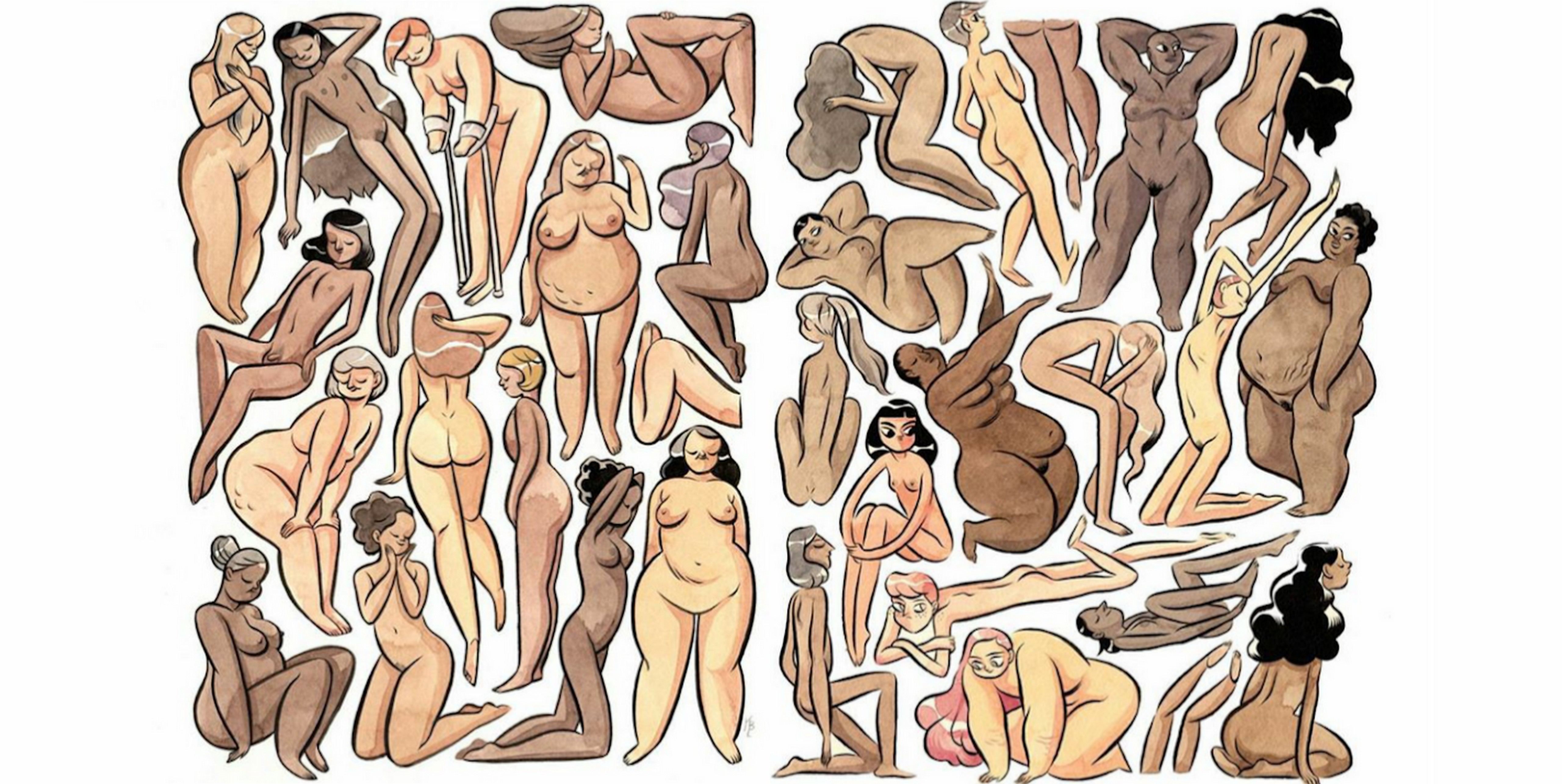This piece has been written by Anonymous.
[TRIGGER WARNING: Eating disorders; Bulimia]
“It is a truth universally acknowledged, that a successful woman in possession of all the means and materials for a fulfilling life, must still be in want of the perfect female body.”
Ms. Austen might as well have proclaimed this verity and it would have been far truer for far longer.
Scroll through your Instagram and you’ll find yourself looking at a mix of envy-inducing posts of your friends/acquaintances/don’t-remember-why-we-are-friends living their best lives looking like they walked out of a Vogue magazine cover, the Hadid sisters looking like they could walk – nay, catwalk all over your crushed soul in towering heels, influencers selling flat-tummy tea, appetite-reducing candies and ways to deal with that pesky bum cellulite, with a light sprinkling of before (sad Pooh bear) and after (female Hulk who could crush you with her glutes) pictures, and innumerable internet trolls telling random women that they’re “uGly aNd No oNe wOUld dO tHem”. And that’s just social media for you, don’t get me started on Bollywood and the perfect ‘kamariya’, or fairness creams advertisements trying to convince us that possessing melanin is a criminal offence, and the list goes on ad nauseum.
Closer home, the ladies in my family are found discussing a new weight loss method every time I see them – from lemon and hot water, to power yoga, to eating only proteins and no carbs (= no happiness) – even though they clearly have worse issues to deal with, for instance, serving hot rotis to their husbands while they chortle over casually sexist mian-biwi jokes on WhatsApp. I have lived most of my life in morbid fear of these ladies who don’t forget to point out if my other female cousins or I have become ‘healthy’ (North Indian family code for ‘who will marry her now’) or ‘sookha hua’ or ‘beta tan ho gaye ho’ every time I meet them at family functions.
Don’t get me wrong, I’m not judging any of these women. We’re all in the same boat, after all. The boat that tirelessly sails towards the sparkling horizon of the perfect female body, powered with the fuel of self-loathing, armed with diet plans, fitness regimes and 50-step Korean skincare. I, like almost literally every woman, struggle with body image issues. Dressing rooms make me cry, cameras give me anxiety and my relationship with food is still ‘complicated’, to say the least. I’ve been through eating disorders. In school, I starved myself – lying to friends that I ate at home and lying to my parents that I ate at school – while acid eroded my empty stomach. For months, I went through the carefully practiced ritual of excusing myself after a meal, going to the washroom, washing two fingers, sticking them far down my mouth, feeling my guilt and my last meal rise in my throat, retching into the toilet bowl, repeating this about a dozen times, flushing and then panting as mucus, tears and shame ran down my face. I did this enough times in a day for my parents to worry I had loose motions. I don’t do that anymore. Not because I’m at complete peace with my body now, but simply because my bulimia took time and energy that I didn’t have after a point of time. I was tired of my throat tasting of regurgitated food, of looking at meals and wondering what they would taste like on their way out and tired of the tell-tale bruise at the back of my fingers. I was lucky to not go further down that vortex. Not everyone is.[1] But still, no matter how much I try and inundate myself in messages of body positivity and telling myself that I must do better than fall prey to these silly patriarchal and capitalistic notions, that feeling of never being good enough never goes away. So, what’s the point of writing this? Is it just a pity party? No.
The point is that we in law school, or generally in life, don’t talk about body image issues and body positivity anywhere nearly as much as we should. The importance of talking about it needn’t be explained if you just read through the above few paragraphs. That was just one story. And it doesn’t have to be as bad as having a disorder for this to be considered a crisis – a crisis of self-esteem, hiding in plain sight in the minutiae of everyday life. Naomi Wolf puts it better than anyone when she says that “…women’s identity must be premised upon our ‘beauty’ so that we will remain vulnerable to outside approval, carrying the vital sensitive organ of self-esteem exposed to air.”[2] Everywhere we look, women are being told that their life amounts to nothing and their success is hollow till they haven’t appeased the male gaze through the ultimate sacrifice of their bodies. Lest someone should complain about the inordinate focus on women: yes, body image is an issue for all genders and sexes but the pressure exerted on women in our patriarchal world to look and behave a certain way is different from, and undeniably more onerous than what men are subjected to. And the most destructive aspect of all this? That you can never ‘get it right’. The perfect female body is always a mirage, a race to the bottom.
It’s no secret that we as a community in law school choose to maintain silence on a lot of important issues. Body image is one such pernicious issue and it is sapping the mental, physical and emotional health of innumerable women, yes, including the Woke Women TM of law school. Our toxic hookup culture, where you’re considered prudish and uncool for not having casual sexual encounters, means that there is a constant pressure to be considered conventionally desirable, lest you be marked with disapproval by the male gaze. Every other person you talk to will casually mention how much weight they need to lose, and we resultantly throng to the gym every evening, mostly for all the wrong reasons. Bad dietary patterns are the norm (one meal and five double coffees a day sound familiar?), providing a great cover for the eating disorders of which we don’t speak. And no change in appearance ever goes unnoticed by the constantly scrutinizing eyes of the law school gossip network of which are all guilty participants. The stigma attached to issues of body image, in our little community and outside, is also perhaps evident from the fact that I write this anonymously, afraid of being thought of as the crazy girl who used to throw up her food. The simple point is that no one should have to feel worthless because they don’t look a certain way. We shouldn’t be telling each other and ourselves that we need to achieve certain physical attributes to be happy, successful and desirable or just comfortable in our own skins. Having this conversation, like many others, requires active effort because we have to force ourselves to question and militate against lifelong pervasive social conditioning.
It’s not about being in love with our bodies; it’s simply about accepting them for what they are. And this acceptance is not easy to achieve unless we, as a community, become more accepting of each other. So maybe next time you’re cracking that fat joke or ranking female acquaintances on their physical assets, stop for a minute and think about the toxic culture to which you’re contributing. Maybe the next time your friend whines to you about how much weight they’ve put on, tell them they’re so much more than their bodies and that amidst all the crazy things that life and law school throw at us, that’s the last thing they should be worried about. If you have thin privilege, realize that your socially acceptable body type doesn’t place you on a pedestal – it is not an accomplishment. Acknowledge and accept the struggles of larger persons and persons with disabilities and be strong allies.
It’s not impossible to unlearn this toxicity, to challenge these standards and falsities that are thrown at us, and to break out of this ‘beauty myth’.[3] But we’ve got to try hard as hell. Let’s not walk around loathing the skin and bones that hold us together.
[1] Over 25% of teenage Indian girls suffer from eating disorders, Scroll, January 5, 2018, https://scroll.in/magazine/863540/over-25-of-teenage-indian-girls-suffer-from-eating-disorders-this-art-project-shows-how-they-feel.
[2] Naomi Wolf, The Beauty Myth (1990).
[3] “The beauty myth tells a story: The quality called ‘beauty’ objectively and universally exists. Women must want to embody it and men must want to possess women who embody it.” – Naomi Wolf, The Beauty Myth (1990).


Comments